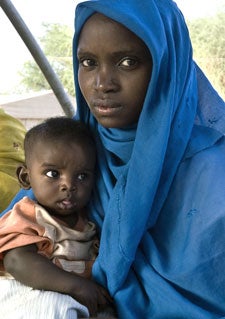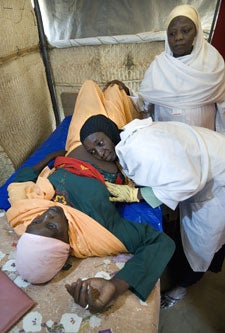News
Darfur Women Fear Giving Birth at Night, Without Midwives to Help
- 30 August 2007
News
|
Read more about the crisis in Darfur in these related features:
|
SERIF, South Darfur, Sudan — Awatif, who is six-months pregnant, is frightened of giving birth after the sun goes down. The camp she has called home for the past four years of her life has no midwife available overnight because of security concerns.

“I’m afraid,” said the 27-year-old mother, swathed in a shawl colored with sunset shades of orange, red and purple. “I’m worried – I don’t know what will happen. I want a midwife to be by me in case something happens.”
Nighttime emergency obstetric cases are a problem in South Darfur’s camps for internally displaced persons (IDPs) because of a lack of trained personnel and transport services after hours, agrees Dr. Widad M/Ahmed Hamad, Sexual and Reproductive Health Programme Officer for UNFPA, the United Nations Population Fund.
“The problem is security,” she says. “We have difficulty making a referral at night for emergency cases.”
This is the second pregnancy for Awatif in this IDP camp outside of Nyala, the capital of South Darfur. She has lived here since fleeing with her family from her village that was attacked multiple times.
“The first time they took all of our cows. The second time, they attacked the people and burned all of our houses,” she says
Awatif, who was married to her husband at the age of 10, is hoping for a girl to join her four surviving boys. Her youngest son was born with the assistance of the camp midwife.
When she lived in the village, it was a three-hour walk to the nearest health care centre where she could see a doctor or midwife. Instead, Awatif relied on the services of a traditional birth attendant. As is the local custom, her hands were tied above her head while the birth attendant pulled on the rope to elongate her torso with each contraction. It was a terribly painful process.

Now Awatif is worried about what will happen if she develops complications overnight, when only donkey carts are available for transport to the hospital in Nyala. “It’s dangerous, and you have to pay a lot of money,” says Awatif.
Maternal mortality is high in Sudan in general and in Darfur in particular, Dr. Hamad said. Nationally, 509 women die for every 100,000 live births, but the difficult conditions in Darfur put women at higher risk. Throughout Sudan, only 71 per cent of pregnant women receive antenatal care and only 13 per cent receive postpartum care during the first six weeks following delivery. In addition, only 57 percent of deliveries are attended by a skilled birth attendant.
“It’s difficult to access services, the coverage of midwives is low and most live far away from hospitals,” she says. “Most people aren’t even aware about how to identify complications, and men as heads of households aren’t aware of the importance of referring their wives, or they are too poor and don’t have the means.”
UNFPA has initiated sensitization sessions at the camps to teach both women and men about the importance of seeking maternal health care from trained medical personnel. The Fund also has begun supporting pooled community-based transportation funds to cover emergency night referrals.
“When men are aware, they are accepting,” Dr. Hamad says. “Sudanese men want what is good for their families.”
" I’m afraid. I want a midwife to be by me in case something happens."
--Awatif
At the IDP camp near Duma, Darelneem used to work as a midwife at the height of the violence in 2003. The situation for pregnant women fleeing the conflict was dire.
“Women lost their kids. They lost their husbands. The situation was horrible,” she says. “While they were running from one village to another, they had serious problems – miscarriage, bleeding.”
Although the fighting has died down, violence still flares in the region, said Sabir Mohammed Hassan, medical coordinator for the clinic in Duma, who expected another 12,000 IDPs to arrive within the next few weeks."
If there is fighting somewhere, they bring them here. When they are beaten in the street they bring them here,” Hassan says. “You see these people when they come how they have suffered.”
A green tent houses the maternal health care clinic, which is supported by UNFPA. Straw mats cover the floor and the smell of disinfectant wafts through the hot air. Sheets cover the operating table and equipment to protect them from the omnipresent dust of South Darfur.
Another sheet separates the ‘operating theater’ from the consultation room, manned by midwife Amina Mohammed, who provides ante- and post-natal care to IDP women. Family planning is also available, but wives must be accompanied by their husbands to receive contraception.
“They have traditional birth attendants (in the camp), but they are not well trained. When they come here and see the services we provide, they realize we can save their lives,” she says. “I’m very proud of what we’ve done here. I’d like to do even more – we’d like to support every pregnant woman in the area.”
— Angela Walker